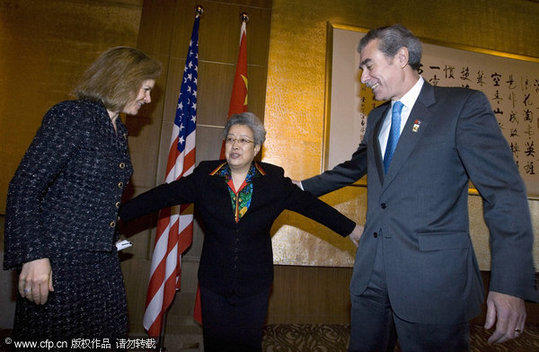Freeing RMB exchange rate not necessarily beneficial to US

Pressing for adjustment in the Chinese Renminbi's (RMB) exchange rate will not get rid of the trade imbalance between the United States and China, a U.S. economist said Wednesday.
"I am not convinced that a free flow would necessarily be beneficial to either the U.S. or Chinese economy," Michael Woolfolk, who teaches International Economics at New York University, commented at Xinhua's question during the Eighth Global Economic Outlook hosted by Dow Jones Indexes.
Woolfolk serves as Senior Currency Strategist at Bank of New York Mellon, which has been ranked the first in the world for currency research by trade magazines Global Finance and Global Investor in their latest annual surveys.
Woolfolk acknowledged the U.S.-China trade relation "is a complicated issue, perhaps one of the most complicated issues with respect to global financial markets."
As a result of the financial crisis, the global imbalance problem "has largely become a trade imbalance" problem between two countries, "a bilateral problem between the U.S. and China," he added.
Noting that Europe and the United States have been pressuring China to appreciate the RMB, Woolfolk doubted it is an ideal solution to the trade imbalance.
"Even we had a market clearing rate right now, perhaps 25 percent higher from where it is now with respect to the Chinese currency, there is still a vast difference in the cost of labor in the U.S. versus China," he said.
"We'll still be buying products from emerging markets, maybe not China, but from neighboring countries," Woolfolk said. "We will not necessarily be buying them from American producers."
The solution, rather than the foreign exchange, he said, is to encourage more Chinese investment in the United States. "(Encouraging China to) invest in U.S. securities market, not just our treasuries but broadly foreign direct investment, and to buy more of our exports," Woolfolk said.
Economists and analysts at Wednesday's panel agreed that there would be a rise of tension between the two countries, because even the recession has passed, the modest economic recovery still isn't able to bring down the high unemployment rate.
"As long as there is persistently high unemployment, it is going to affect consumer confidence,...and politics," Kevin Logan, an independent global economist and member of the National Association for Business Economics, told Xinhua.
"People will look for either a scapegoat, or a solution that is not going to cost anyone here anything, but will cost someone else," Logan said.
Logan said whenever and wherever there are downward pressures on wages and incomes with a high unemployment rate, it usually leads to rising protectionism in trade.
 0
0 






